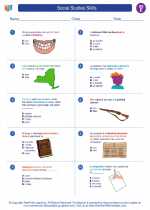Social Studies Skills -> american history
Colonial America
- Q: What were the 13 original colonies?
- Q: What was the significance of the Mayflower Compact?
A: The 13 original colonies were Virginia, Massachusetts, New Hampshire, Maryland, Connecticut, Rhode Island, Delaware, North Carolina, South Carolina, New York, New Jersey, Pennsylvania, and Georgia.
A: The Mayflower Compact was a key document that established the idea of self-government and majority rule among the Pilgrims who arrived in Plymouth in 1620.
American Revolution
- Q: What were the causes of the American Revolution?
- Q: Who were the key figures in the American Revolution?
A: The causes of the American Revolution included issues such as taxation without representation, restrictions on trade, and the desire for self-governance.
A: Key figures included George Washington, Thomas Jefferson, John Adams, Benjamin Franklin, and others who played pivotal roles in the fight for independence.
Founding of the United States
- Q: What is the significance of the Declaration of Independence?
- Q: What were the major debates during the Constitutional Convention?
A: The Declaration of Independence, adopted on July 4, 1776, proclaimed the 13 American colonies' independence from Great Britain and articulated the principles of individual rights and self-government.
A: The major debates included issues such as representation in Congress, the powers of the federal government, and the inclusion of a Bill of Rights.
Westward Expansion
- Q: What were the causes and effects of the Louisiana Purchase?
- Q: What were the challenges and opportunities of westward expansion?
A: The causes of the Louisiana Purchase included the desire for access to the port of New Orleans and the effects included the doubling of the size of the United States.
A: Challenges included conflicts with Native American tribes and the hardships of frontier life, while opportunities included the promise of land and economic prosperity.
Civil War and Reconstruction
- Q: What were the main causes of the Civil War?
- Q: What were the goals and outcomes of Reconstruction?
A: The main causes included issues of slavery, states' rights, and economic differences between the North and South.
A: The goals of Reconstruction included integrating the Southern states back into the Union and granting rights to newly freed slaves. The outcomes included the passage of the 13th, 14th, and 15th Amendments to the Constitution.
◂Social Studies Worksheets and Study Guides Fifth Grade. Social Studies Skills

 Worksheet/Answer key
Worksheet/Answer key
 Worksheet/Answer key
Worksheet/Answer key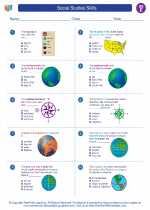
 Worksheet/Answer key
Worksheet/Answer key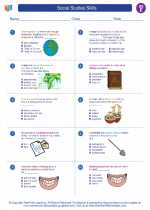
 Worksheet/Answer key
Worksheet/Answer key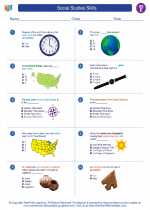
 Worksheet/Answer key
Worksheet/Answer key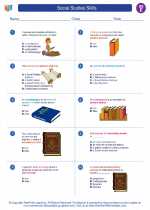
 Worksheet/Answer key
Worksheet/Answer key